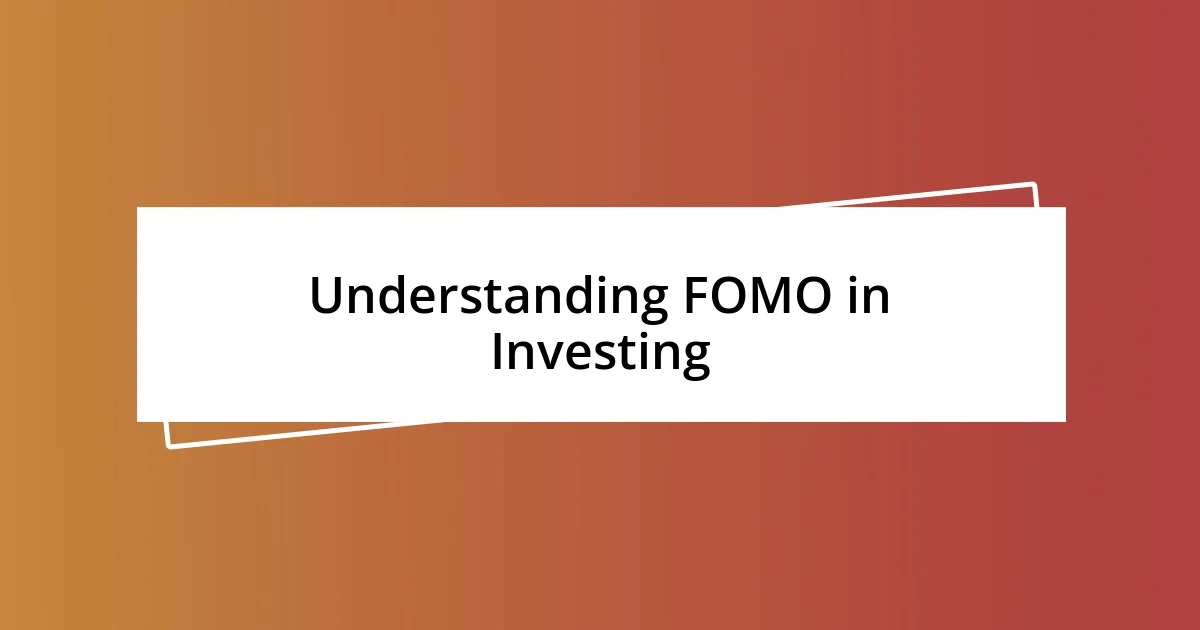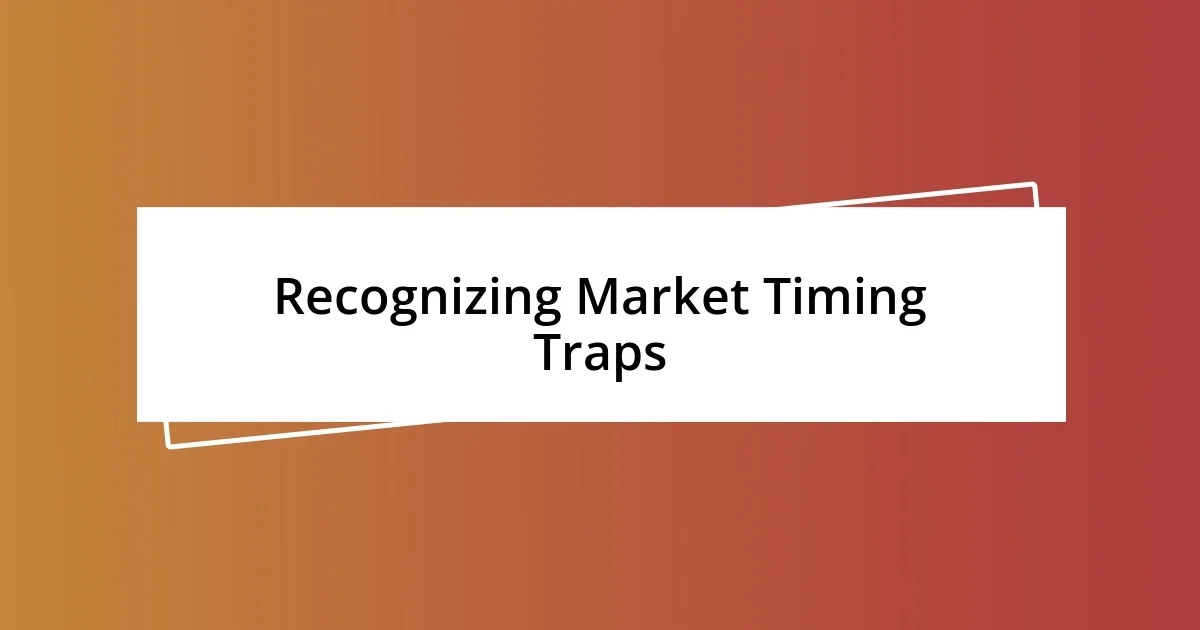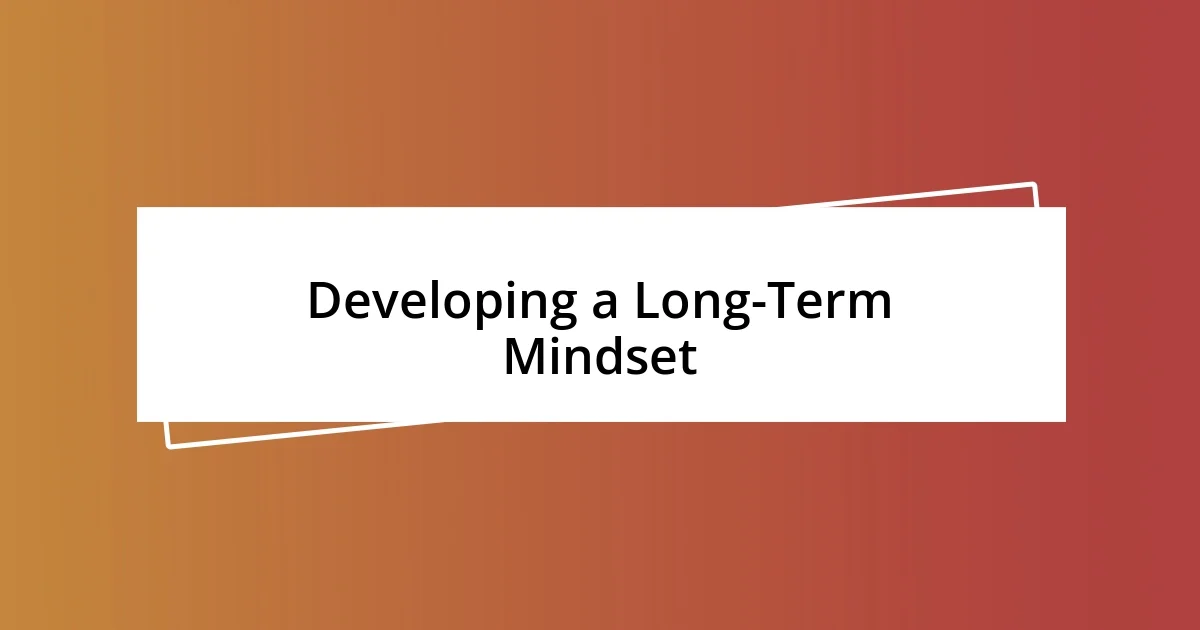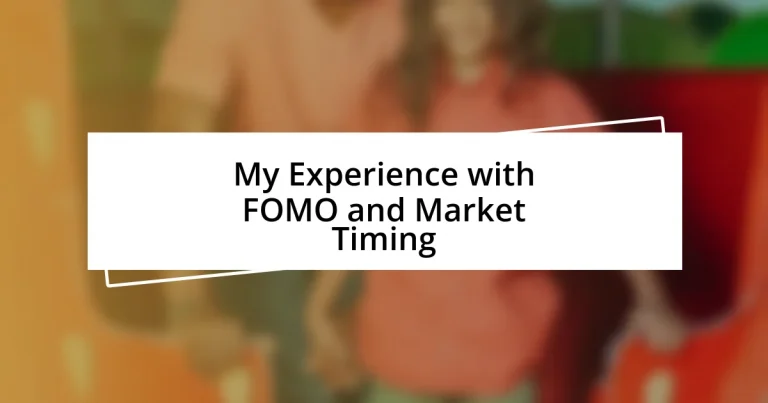Key takeaways:
- FOMO significantly influences investment decisions, often leading to impulsive actions based on social comparison rather than thorough research.
- Recognizing market timing traps and emotional triggers, such as overconfidence and peer pressure, can help investors make more informed choices.
- Developing a long-term mindset and regularly aligning investments with personal goals reduces the emotional impact of market fluctuations, fostering a more strategic approach.

Understanding FOMO in Investing
FOMO, or the Fear of Missing Out, is an emotional driver that can greatly impact investment decisions. I remember my own experience when Bitcoin surged in value a few years ago. Friends were sharing their significant gains, and I felt that familiar tug—should I invest too? It’s as if you’re paralyzed by the thought of watching others profit while you hesitate.
Investing under the influence of FOMO often leads to impulsive decisions. I’ve found myself diving into stocks simply because everyone else seemed to be doing it, rather than basing my choices on thorough research. Have you ever bought into a trend, only to watch it falter soon after? That was a hard lesson for me.
What’s truly fascinating is the psychology behind FOMO. It stems from a combination of social comparison and the fear of being left out of potentially profitable opportunities. Reflecting on my own journey, I realize that understanding this feeling can empower us to approach investing more judiciously. When I started treating investments as long-term commitments rather than quick wins, I could quell the impulse to give in to FOMO.

Recognizing Market Timing Traps
Recognizing market timing traps is crucial for any investor seeking to navigate the rollercoaster of the financial world. I’ve often found that when markets are volatile, the allure of timing the market can be tempting. For instance, during the tech boom, I recall getting swept up in the excitement of buying into trending stocks right before a market dip. It felt like an exhilarating rush, but the aftermath was filled with regret as I realized I had let emotions override my better judgment.
To avoid falling into these traps, consider the following warning signs:
- Overconfidence: Believing you can consistently predict market movements often leads to disappointment.
- Peer Pressure: Making investment decisions based on friends or media hype instead of research can result in losses.
- Short-Term Thinking: Focusing solely on immediate gains may blind you to the long-term potential of your investments.
- Market Noise: Ignoring the fundamentals of a company in favor of trending news can skew your perspective.
Recognizing these signs early can be a game changer in how we approach investing. It’s all about staying grounded and making decisions rooted in sound analysis rather than fleeting emotions.

Personal Experiences with FOMO
I still vividly recall a time when I let FOMO take control of my investment decisions. A colleague of mine was raving about a hot new tech stock that was climbing rapidly, and I felt an urgent wave of anxiety wash over me. What if I missed out on the next big thing? Without doing my due diligence, I invested a chunk of my savings, only to watch the stock plummet shortly after. That feeling of panic turned into regret, and I learned the hard way that decisions fueled by FOMO often lead to bittersweet outcomes.
Another incident that stands out was during a bull market, where everyone seemed to be cashing in on real estate. I watched countless social media posts showcasing friends’ new investment homes, and their excitement was contagious. The fear of being the only one missing out pushed me into a property investment that I wasn’t entirely ready for. I remember pacing the floor at night, questioning whether I had made the right choice. That experience taught me that while FOMO can ignite action, it’s essential to balance that impulse with careful consideration.
When I reflect on these experiences, I realize how powerful the influence of FOMO can be, not just on my wallet but on my mental well-being. I often think about how if I had taken a moment to analyze my motivations or seek guidance, I might have avoided those pitfalls. Now, I strive to remind myself that investing is not a sprint; it’s more of a marathon that rewards those who maintain steady, thoughtful pacing.
| Experience | Emotion |
|---|---|
| Investing in tech stock | Regret and anxiety |
| Buying real estate | Uncertainty and self-doubt |

Strategies to Combat FOMO
When I felt the grip of FOMO creeping in, I realized that having a clear investment strategy could make all the difference. I started setting specific financial goals and timelines, which provided me a framework to evaluate opportunities rather than jumping on every latest trend. What I found was that when I remained focused on my own goals, the noise of what others were doing became far less distracting.
One afternoon, during a particularly frenzied market rally, I resisted the urge to trade impulsively. Instead, I took a step back and did a personal inventory of my investments. This reflection helped me understand what truly aligned with my long-term vision. Asking myself, “Does this fit my strategy, or am I just trying to keep up with others?” shifted my mindset. It empowered me to make more informed, deliberate decisions rather than reactive ones.
I also embraced the power of staying informed through trusted resources rather than social media buzz. By cultivating relationships with knowledgeable mentors and joining investment groups grounded in research, I discovered not only support but also accountability. Wouldn’t you agree that discussing ideas with others who share your values can illuminate new perspectives? Engaging in thoughtful conversations fortified my confidence and kept me aligned with my objectives, diminishing the emotional weight of FOMO.

Evaluating Market Signals Effectively
To effectively evaluate market signals, I’ve learned that context matters immensely. For instance, when I first started tracking market trends, I often got swept up by headlines that seemed sensational. It wasn’t until I began cross-referencing news stories with historical data that I respected the bigger picture. The realization hit me hard: sometimes, what appears to be a strong signal might just be noise. How many of us have felt the rush of a breaking news alert, only to later question our immediate reactions?
Moreover, I’ve found that keeping a close eye on volume alongside price movements is crucial. One time, I noticed a stock surge dramatically one afternoon with very little trading volume behind it. I decided to hold off on jumping in, and a few days later, the stock corrected itself. I often think back to that moment—how it reminded me that sustainability matters. Isn’t it fascinating how learning to observe these signals can turn confusion into clarity?
Reflecting on my journey, I can’t stress enough the importance of patience and analysis. I’ve made it a habit to jot down my thoughts each time I sense a market shift, aligning them with a ‘why’ behind the changes. Taking that time often reveals deeper insights, helping me recognize if I’m reacting to justified signals or just falling prey to fleeting emotions. Have you ever considered how a simple journal could illuminate your decision-making process? It’s been a game-changer for me, allowing me to assess not just the signals, but my own psychological responses to them.

Developing a Long-Term Mindset
Developing a long-term mindset requires conscious effort and self-awareness. I remember a time when I let the market’s ups and downs dictate my mood, feeling overly excited about gains and disproportionately upset over losses. It dawned on me that I was investing emotionally and not strategically. Shifting my focus to broader horizons helped me appreciate the journey rather than obsess over daily fluctuations.
One evening, while reflecting on my investment choices, I realized I had a tendency to underestimate my own patience. I decided to commit to a few select stocks for the long haul. By doing this, I felt a sense of relief wash over me, almost like lifting a burden. Knowing I had a plan in place made it easier to navigate those inevitable market dips without falling into despair. Have you ever noticed how feeling grounded can make all the difference in your decision-making process?
Regularly revisiting my long-term goals has also become essential to my strategy. It’s like a personal check-in to see whether my actions align with my vision. I sense a surge of motivation whenever I revisit my initial aspirations, grounding myself before engaging in potential trades. That feeling of clarity reignites my confidence and helps me steer clear of impulsive choices. When was the last time you reflected on your financial intentions—how did it affect your mindset?














